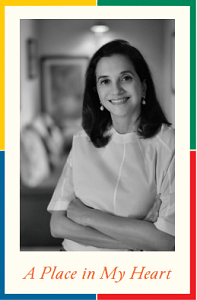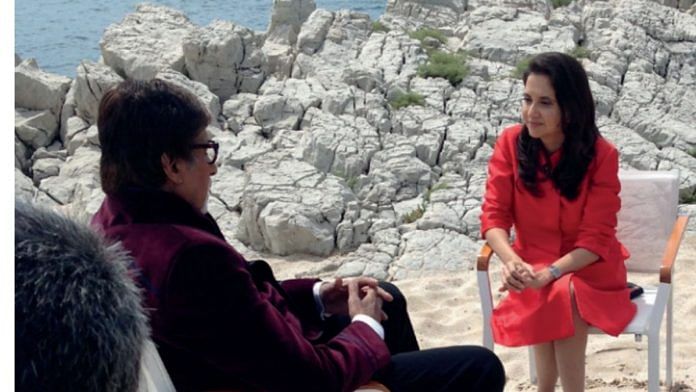This is Amitabh,’ he said, as though that baritone could belong to anyone else. It was my first encounter with the actor. We were speaking on the phone, sometime in 1995. The great American photographer Mary Ellen Mark had been commissioned by the film magazine Premiere to do a photoshoot with leading actors in the Hindi film industry. I was an editorial assistant, helping to line up the talent. On the wish list was the leading man who had defined Hindi cinema for decades. These were pre-cell phone days. I left messages with his secretary, which is what talent managers were called then.
A few days later, he called back. I was a newbie but I had a master’s degree in journalism from Northwestern University. I considered myself too professional and too inherently cool to be swayed by Bollywood stardom. And yet, something about his voice was so commanding that I had to sit down to have the conversation. He was exceedingly polite. I can’t remember why, but he declined to do the shoot.
Amitabh Bachchan is India’s most enduring superstar. He has been a part of our collective psyche for more than fifty years. He cuts a colossus-like figure, towering over films, television, commercials, the press and even social media, with millions of followers across platforms. When an actor has lasted that long, he becomes a human Rorschach test, signifying different things to different people. Your take and your degree of attachment to Mr Bachchan (I wouldn’t dare address him as anything but that or ‘Sir’) depend on your vintage, gender, taste. For those of us who came of age in the 1980s and 1990s, he was, as India Today magazine dubbed him, a one-man industry. So outsized and dazzling that we barely noticed anything else in the frame.
We grew up on the singular heroism of Mr Bachchan. Some of my favourite Hindi films are still the ones from the 1970s that firs established him as a star. The Angry Young Man, created by the brilliant Salim-Javed in the early ’70s, was an archetype that shaped the narrative in mainstream Hindi cinema for two decades. In films like Zanjeer, Deewaar, Sholay and Trishul, Mr Bachchan delivered performances that still crackle with frisson.
Unlike the other leading men of the time, he wasn’t handsome in that fair-skin, ‘khaate-peete-ghar-ka’ way. Instead, he was lean and gangly. In these films, there was something bruised and brooding about him. When we first met these characters, we instinctively understood that they had already survived some personal hell.
Look at Vijay’s furious expression in Zanjeer, when he kicks the chair in the police station and tells Sher Khan (played by a terrific Pran), ‘Jab tak baithne ko na kaha jaaye, sharafat se khade raho. Yeh police station hai, tumhare baap ka ghar nahi.’ Or the hurt and desperation in his voice, when, as the angst-ridden criminal Vijay in Deewaar, he walks into a temple for the first time in his life and begs God to punish him but save his dying mother. Or that defiant dignity with which, when money is flung at him in the same film, he says, ‘Main aaj bhi phenke hue paise nahi uthata.’
But Mr Bachchan’s brilliance is that his artistry is, to steal a phrase from Shakespeare, one of ‘infinite variety’. So the same actor could, in the same film, be equally effective as the superbly suave Don, who declares with effortless cool: ‘Don ko pakadna mushkilhi nahi, namumkin hai’, and the country bumpkin Vijay, the ‘Ganga-kinare wala chhora’ who explodes with joy when he can finally stop pretending to be the smooth criminal Don and instead drink bhang and chew on some ‘paan Banaraswala’. The song has millions of views on YouTube because Mr Bachchan’s effervescence is contagious. He makes you want to dance with that same abandon.
Mr Bachchan could also be, with equal ease, the liquor dealer Anthony in Manmohan Desai’s classic Amar Akbar Anthony, creating one of Hindi cinema’s most iconic drunk scenes; and the poet Amit in Yash Chopra’s Kabhi Kabhie, the ‘pal do pal ka shayar’ who voluntarily gives up the woman he loves but then spends a lifetime nursing the scars of his failed love story.
Also read: How did Laxmikant-Pyarelal end Shankar-Jaikishan era in Bollywood? Happier, cheaper music
Ironically, the actor who could effortlessly juggle drama, romance, music, comedy and tragedy ended up being straitjacketed by his own stardom. Mr Bachchan became so successful that filmmakers stopped being inventive with him. Through the ’80s especially, he seemed trapped, playing watered-down versions of roles he had done before. Over the decades, Mr Bachchan’s gargantuan stardom has waxed and waned.
A detour into politics in the mid-’80s and a series of mediocre comeback films after his sabbatical in the mid-’90s proved to be disastrous. But his fundamental ability to connect with the audience remained intact. Which is why his hold over our imaginations, reignited by the television show Kaun Banega Crorepati (KBC, launched in 2000), hasn’t faltered despite the generations of new actors who came after, including the Khan trinity: Salman, Shah Rukh and Aamir. From the anti-establishment crusader, he evolved into the nation’s favourite patriarch. On KBC, there was something reassuring about his dignified presence in our homes every night. With his amiable manner, impeccable Hindi and sartorial elegance, he elevated not just the game show format but Indian television as a whole. He was the first A-list star to make this crossover and do it in a way that amplified rather
than downsized his image.
It’s hard to describe what Mr Bachchan means to people. I remember one of my earliest assignments as a cub reporter for Movie magazine. We used to go studio-hopping and try
and get interviews with stars who happened to be shooting on the day. One day, I walked into the Filmistan studio and asked a lightman, ‘Aaj kaun aaya hai?’ He simply said, ‘Bhagwan.’
Bachchan was in the building (I didn’t get the interview). And yet, despite this pedestal that we have placed him on, his humility is so unshakeable that it’s exasperating. Through the years, we’ve done several interviews, and each time I’ve asked about his stardom, he’s dismissed it as a ‘media-made’ construct.
He simply refuses to acknowledge his own myth. And yet, it is this very myth that has made him such an effective voice on everything from polio vaccination and anti-tuberculosis drives to climate change. Generations of Indians have been gently, with a nudge and a wink, reminded to be healthier, kinder, better. What helps to make the mythification more palatable is his wicked sense of humour. I recall an interview we did for
the American trade magazine Variety. He had recently started his blog and was taking me through a typical day in his life, which included exercising at dawn, shooting through the day and writing for the blog around midnight. I asked, ‘When do you sleep?’ He replied with a straight face, ‘During interviews.’ These zingers aren’t accompanied by any change in expression. He keeps a straight face but you can see the mischief in his eyes.
Also read: How Shah Rukh Khan ‘romantically ruined’ women – married, working, mothers
One of Mr Bachchan’s long-standing complaints about me has been my faulty Hindi. Like him, I’m from Uttar Pradesh, and he has advised me repeatedly to sharpen my mother tongue. He’s even reminded me on Twitter. On 31 December 2017, I posted my New Year resolutions for 2018. He promptly posted a response to my post, saying, ‘Why wait for New Year to do all this . . . you should do it everyday! . . . errm . . . one resolution missing . . . learn to speak Hindi, if you are reviewing Hindi cinema.’ It was like being scolded in public by an elder in the family!
Mr Bachchan’s films have shaped my understanding and expectations of cinema. His performances, and the dexterity and conviction with which he played even the most outlandish roles, nurtured in me a life-long love of Hindi films. This is an actor who, in Amar Akbar Anthony, could step out of a giant egg, wearing a top hat, tailcoat and monocle, blabbering gibberish, and create not just delightful comedy but also a new expression of love. There aren’t too many actors who could do that.
My favourite Mr Bachchan memory, though, is from a poetry-reading session on a terrace. There were few people present. He read his father Harivansh Rai Bachchan’s classic, Madhushala, patiently stopping to explain the lines that he knew I wouldn’t understand. The wisdom and warmth in his voice was magic. Like the exquisite poetry he was reciting, Mr Bachchan is one for the ages. His first name means everlasting light—and what could be more fitting?
 This excerpt from ‘A Place in My Heart’ by Anupama Chopra has been published with permission from Penguin Random House India.
This excerpt from ‘A Place in My Heart’ by Anupama Chopra has been published with permission from Penguin Random House India.



